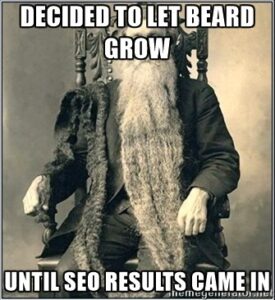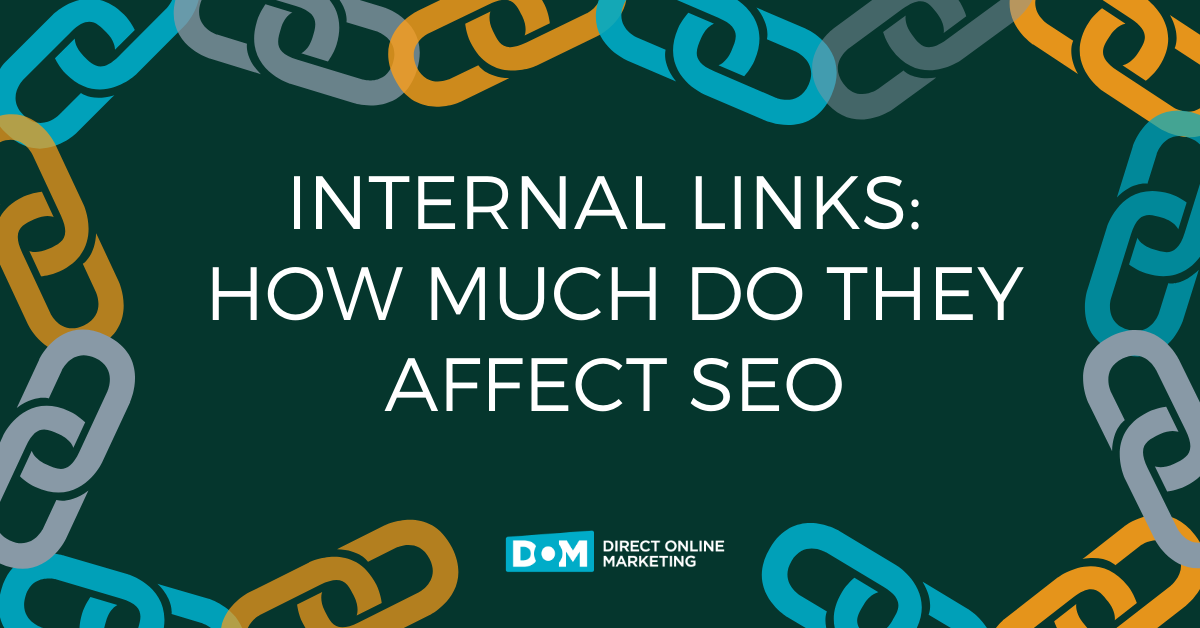
Whoever said good things come to those who wait must have had a feeling that Search Engine Optimization was on the horizon. SEO is petulant, unpredictable, and absolutely necessary to score some sweet rankings on the SERPs.
In the garden of Search Engine Marketing, SEO is an onion. It is ugly on the surface, and as you peel back the first few layers, the work becomes increasingly difficult and tedious. Thankfully, DOM can manage your SEO if you don’t like onions.
One layer is an algorithm update that renders 80% of your work useless.
The next layer is a website shutting down and losing your hard-earned backlinks.
In yet another layer, you discover that during SEO migration services the 301 redirects weren’t set up appropriately and all your links were vanquished.
When the tears are streaming down your face and you’re ready to throw that stupid SEO onion into the garbage, you peel back one last layer, and there it is: a beautiful, trustworthy site, organically ranking on page 1 of Google.
The key horticulturist (I’m looking at you, Google) of the SEM Garden keeps things tidy by pruning away practices that used to be completely acceptable, but that are now no longer welcome, through their algorithm updates. This has made SEO even more difficult, but it has also made it a less adulterated process.
This post is where we air our grievances with SEO and come up with solutions. Maybe along the way we can even change our perspective on SEO since a change in perspective is sometimes all you need to figure out the issue.
To assist me with the airing of grievances, I have received feedback from businesses large and small on their experiences with SEO.
Leon Kwan, Co-Founder, Main Event Specials
“I have had good and bad experiences on SEO for the past 5 years. I have some review sites that got some results (around $1k per month) in the past but it has been penalized by both Penguin and Panda.
The most difficult time on SEO is the waiting time because you must wait for several months (depends on the competitors) to get the SEO results.
I still use SEO tactics when launching a digital marketing campaign, but I diversified it with other marketing tactics like social media, email marketing, paid advertising, etc.”
Pro-tip: First off, good call on integrating other tactics into your digital marketing campaign efforts. Diversifying your strategy definitely helps in achieving the results you desire.
Second, I feel your pain on the SEO waiting game. It is easy to get discouraged when your hard work is not immediately recognized by the search engines. Unfortunately, there really isn’t any way to speed up the organic process. What’s best is to set long-term goals to measure your SEO efforts. In the short-term, set modest goals: earn a specified number of quality links each week, create original content once a week, and audit your site for crawl issues. Achieving small goals can make the wait for SEO results more bearable.
Vladimir Gendelman, CEO, Company Folders
“Company Folders’ marketing strategy was once based solely on SEO. We built links from as many websites as possible and ranked first—or even first and second—for industry-related keywords in Google’s organic search engine. It was a wildly cost-effective, popular tactic at the time.
The problem was, these low-quality links were our only marketing strategy. In 2012, Google updated its algorithms to examine link quality—not just quantity. The search engine penalized our ranking because of our over-optimized links. In just a matter of weeks, our website traffic dropped nearly 65%, eventually pushing us to the brink of bankruptcy.
The only hope of recovery was to completely change our strategy. We stopped all SEO tactics. Now, we focus on content marketing and social media. Through these channels, we’ve established ourselves as thought leaders in our industry and gained a large online following.”
Pro-Tip: Remember how I made that awesome onion analogy earlier? This is a key example. SEO isn’t just building links; content marketing is most certainly one of the layers of effective SEO, and can yield incredible results when done with precision.
I know that it can be nerve-wracking (or in some cases, site-shattering) to get hit with penalties from Google, and the temptation to back away slowly (or rapidly) is great. Creating quality content is a great way to organically build links to high-quality sites, without the looming fear of a Google penalty. I would recommend keeping at the content marketing and social media, but implementing technical SEO (such as site audits, keeping your meta and title tags updated) can boost your site rankings.

“I’ve seen Internet Marketing yielding far better ROI than all off-line channels combined for some businesses.
That being said, I wish companies stopped assigning budgets based on their ‘gut feel’ of how much what channel ‘deserves.’ The outcome should be the focus. It takes 2 to tango, but it takes a team to make a business work. Once you make your whole team work like a clock, where everyone understands the importance of everyone else, the relationship between SEO and ‘media’ marketing will stop being complicated.”
Pro-Tip: Budgeting for online marketing strategies is always tough in the early going, but in my experience, the results will speak for themselves. If your marketing department has a fixed budget to throw around each month/quarter/year, and you want them to allocate a bigger portion of that spend to SEO and search marketing strategies, you need to be able to show the impact those strategies are having on your sales figures.
In today’s marketplace, most business owners and decision makers don’t need to be told their customers are searching or using the Internet to influence their buying decisions.
If your dealership has Customer Relationship Management (CRM) software, review its data to see if you can reverse engineer an ROI on your strategies. No CRM? No worries. You probably have a database somewhere of sales inquiries and credit applications generated online.
Compare that list to your sales log. If you can show that the ROI of SEO and search marketing is higher than other channels, asking for a larger allocation of the marketing budget should be much easier and get you the results you want.
Ryan Speier, Co-Founder, BriskSale.com
“We’ve optimized our pages for search engines by using meta tags and relevant keywords. In addition, we also made sure our pages render in HTML so robots can crawl and every page can be indexed. As far as difficulties go, in addition to Google’s algorithms being unknown, Google’s personalized results makes SEO almost pointless since results are curated for the person doing the searching and are largely out of the control of the company. Also, SEO is only part of the battle as small startup companies certainly cannot rely on search engine clicks for adequate traffic.”
Pro-Tip: Ryan has absolutely hit the nail on the head with 3 of the top difficulties of SEO: unknown algorithms, personalized results, and the time it takes for adequate traffic leveraged with the need for spreading brand awareness and creating a customer base.
Personalized results can certainly change the look of a results page on a person to person basis, but that doesn’t make SEO pointless. It does, however, require a change in tactics and perspective. There are many different ways to get your brand in front of local searchers. A good place to start is changing your approach to how you optimize your web content. To start, you can verify your business in Google My Business, make sure your business listings on other sites match, and request reviews from customers to your listing for improved rankings in location-based searches. Tag your images to infiltrate searches that are done where visual content is crucial.
Publishing videos, articles, or blog posts on your site that are informational and answer 
While there’s really nothing that can be done about the unknown algorithms, play it safe and stick with white hat tactics, no gray hat, no black hat. Keep your strategies and content on the up-and-up and Google will have no need to penalize you.
Small business startups should combine a multitude of marketing efforts to achieve results and create awareness. My personal favorite tactics are of the guerilla variety, if you have no idea what this is, there’s a great book on the subject, and a social media version as well. Guerilla strategies were created for small businesses as a way to combat the corporate pervasiveness in the marketplace.
No matter what marketing you decide to do, your best bet to attract and retain customers is by providing them with a site that is optimized for your product or service. We look everything up online, and if a website is questionable, has irrelevant or incomplete information, the odds of getting traffic and growing your customer base are slim. SEO alone cannot help you, but it certainly plays a role in the success of your site.
Cori Carl, The Caregiver Space
“Some of the best SEO results I’ve gotten have come from undoing the work of SEO firms my clients have hired. Disavowing thousands of spam posts on unmoderated message boards, removing bogus internal links, and removing dozens of low-quality posts.
If you’re not familiar with SEO, it can be hard to distinguish reputable firms from people using the sort of black hat tactics that will hurt your site for years to come.”
Pro-Tip: This is a great example of how the algorithm updates have completely changed the way SEO is done. Before 2012, the reputation and quality of the sites that linked to your domain had almost no impact on how they boosted your SEO. After the algorithm changes hit, SEO’s needed to undo all the ‘shady’ practices that they had put into place, and find a way to comply with Google’s new standards.

We’re strapped for time here and don’t have a lot of time to create new content. Would this be a service you’d be willing to provide?” If they say yes, or seem interested, then I’d stay away.
Jeff Neal, Blogger, Jason Coupon King
“My biggest hassle with SEO is the looming fear that Google is going to make some notorious update to their algorithm that will wipe out all of my rankings. Coupon and frugal living sites appear to be more popular. But will Google look at these sites like they are spam, because of all the coupon links and deals? This is my fear with SEO. That all of my content creation, all my meta tags, and all my backlinks will just suddenly bust.
But content and social media exposure have worked. But nothing has worked better than disciplined article creation. It’s too frightening to try and boost your rankings inorganically. Because if Google slaps you, you’re done.”
Pro-Tip: Well Jeff, I’m no expert on the human psyche, but it seems that you may be a sufferer of Googlenoia. But fear not, for you are not alone in being plagued by this condition. It’s understandable that you feel this way, as there are a lot of spammy sites in the same industry as you are.
I checked out your site (good call on the Beastie Boys music video, by the way) and it looks pretty legit—your internal linking is well done, backlinks are to reputable sites, and there’re no weird pop-ups or incoherent links or content.
As long as you keep your backlinks reputable, your content relevant, and your guest contributions and social media efforts thoughtful and pertinent to your industry, you should have no fear of the wrath of Google.
Alexander Reichmann, CEO, iTest Cash
“My business has been through a lot with SEO. One of the biggest challenges in SEO is that there are no regulations for SEO companies, so to find a good one it really pays to know your stuff. I have worked with 3 SEO companies that ended being a waste of money until I finally found the right people to work with. I figured out how to use SEO to my advantage after years of experience and working with multiple companies. In the past year, I have seen our rankings rise and I still use SEO as part of our strategy.
For an SEO method itself, I have found that the most effective strategy, in the long run, is to create good content and get solid links. It comes down to the basics you may hear over and over, but it takes a lot of work to get it right. Link building has been one of the most challenging parts of our strategy but I’ve learned that there are tons of websites in my industry that are happy to get content submitted to them as long as it is high quality.
I believe SEO can be well worth it in the long run but you really have to know what you’re doing. SEO done right can be the difference between a site’s rankings tanking overnight or having long-term growth in search engine exposure.”
Pro-Tip: Thank you for sharing your story, Alexander. As you eventually run out of websites that are directly in your industry that are willing to accept your high-quality content, you may want to try submitting articles to trade publications, associations, and blogs that cover the main industries of your target customers. Small business organizations, Chambers of Commerce that support brick and mortars, and even sites that provide tips for franchises might provide great opportunities for your site to generate unique links from a diverse group of authoritative sites.
Bonus Tip: Place links in your newly created guest blog content to articles and resources you have published in the past, which will also increase the value of those links to your SEO campaign.
The Recap:
Let’s take a look back on what our journey on navigating the pitfalls SEO has taught us, shall we?
SEO has evolved, especially with new algorithm implementations; where SEO was once slapdash (get as many links as you can! Stuff keywords into meta and title tags!) it is now way more involved and complex. There are many components to factor in to grasp the breadth of SEO. Because I’m so nice, and you may not want to read the rest of this article even though it is CRAZY insightful, here is a bulleted list of the facets of SEO:
• Technical SEO—including everything from addressing crawl issues and eliminating 404 errors to properly implementing redirects and improving page load times
• Offsite SEO—including accurate business listings and citations for local SEO, link building, social media sharing of your content and content marketing
• On-page SEO—including the creation of high-quality content on your site, with well-optimized titles, meta data, and h-tags, plus the strategic placement of images and keyword rich links to other pages
Yeah, SEO has come a long way from its former ‘bad boy’ days of black hat trickery and search engine manipulation. Organic rankings are, in my opinion, the most trustworthy and relevant. I am more likely to click on a listing on the first page of Google than I am to click on the advertised/sponsored link. SEO is time-consuming, but it is cost effective, communicates trustworthiness and value to your target audience, and can result in more sales and traffic to your site. With that being said, let’s explore the many layers of SEO.

Content plays a much larger role in SEO than ever before. However, it’s not enough for the content to be optimized—as most content that is simply optimized is not engaging. It’s also not enough for the content to be engaging—as engaging content often does not meet the criteria for a well-optimized piece for search. The best content for SEO success is both optimized and engaging. When you create the right combination of this for your website, its impact can be seen in your SEO campaign AND in the results generated to boost your bottom line.
There are some aspects of SEO that remain the same; local link building is of critical importance if you’re target audience is in a specific geographical location. Make sure you’re listed on Google My Business (with appropriate business information, pictures, website, etc.), and that all of your business listings in local directories are correct and cohesive.
What remains largely (and annoyingly) the same is the time it takes between SEO implementation and noticing results. Technical SEO efforts will have a faster turnaround time for noticeable results, but nothing nearly as instantaneous as paid search. Link building and content creation will take longer to notice results, but building trust takes time. Once you have acquired Google’s trust, (in the 6 weeks or so it will take before you notice results), you will see the wait was worth the reward.
Even though we learned about all these wonderful aspects of SEO, how it can offer consistent, steady rankings, how it is cost-effective, how it creates value for customers and gets your respect from Google, is it still an onion? Um, heck yes it is. More often than not you’ll wind up in tears (or close to it) when peeling back all the layers that comprise SEO.
Don’t rely solely on SEO; there aren’t many digital marketing agencies that offer only SEO. That’s because SEO on its own does take too long for results, to build awareness and create traffic. There are many delicacies in the Garden of SEM, and it would be short-sighted to overlook them. Just remember, SEO is a delicious ingredient that brings more flavor to the stew of digital marketing. And on that note, I’m going to grab some lunch, because all this metaphor talk centered on food has made me famished.
Until next time, my digital darlings.
To get more information on this topic, contact us today for a free consultation or learn more about our status as a Google Premier Partner before you reach out.






